The USA until the very last moment waited for the Japanese to attack the Russians
October 18 The 1941 of Japan officially announced the creation of the Tojo government. The emperor's farewell was unprecedented: Tojo was told that the new government was not bound by any previous decisions. Tojo's coming to power meant that Japan was ready for war.
On October 16, 1941, on the front page of the New York Times, a message came out from Tokyo about the public appearance of the chief of Japanese naval intelligence, Captain Hideo Hirada. The United States and Japan, he said, “have come to the point when their paths diverge ... America, feeling insecure in the current situation, is carrying out a huge expansion fleet. However, America cannot simultaneously conduct operations in the Atlantic and Pacific oceans. The imperial fleet is ready for the worst and has completed all necessary preparations. Moreover, the imperial fleet is burning with a desire to act if it proves necessary. ”
However, Washington was still convinced that if Japan started a war, it was not against the United States. Under this belief urged all incoming facts and news. So, Roosevelt, telling Churchill about the consequences of the new government coming to power in Japan, noted that the situation with the Japanese had definitely worsened, “and i think they are heading northbut because of this, you and I have a two-month respite in the Far East. ”
In the same vein, the Starck directive was sent to the Pacific Fleet Commander Kimmel 16 of October: “The resignation of the Japanese cabinet created a serious situation. If a new government is formed, it will appear to be highly nationalistic and anti-American. If Konoe’s office remains in power, he will act with a different mandate, not involving rapprochement with the United States. In any case, the war between Japan and Russia is most possible. Since Japan considers the United States and Britain to be responsible for its current desperate situation, there is a possibility that Japan might attack these two powers. ” Thus, in the United States, as before, they believed that a new Russian-Japanese war was most possible. Although they realized that in the Japanese leadership the nationalist and anti-American party prevailed, that is, the likelihood of an attack on both England and the United States.
The British held a similar position. London also believed that Japan would attack Russia in the near future. However, considering this perspective from the point of view of the interests of Britain, in London it was considered unreasonable to allow the Axis powers to beat their opponents separately. The British government wanted to know what the United States would do when Japan attacks the Soviet Union. American calculations were based on the fact that the government is formed by General Hideki Tojo. He was closely associated with the Kwantung Army, which was preparing to fight with the Russians, and was viewed in Washington as a supporter of further rapprochement with Germany. Similar views held in London. The leadership of British intelligence in the Far East reported: “The new prime minister is fully pro-German. It is believed that the Japanese will rush to Vladivostok and Primorye as soon as the inevitable collapse of the Soviet resistance appears ... So far the Russians are stronger in Siberia, despite the possible withdrawal of troops from there, but Primorye and Vladivostok can be captured by the Japanese. " Nothing could shake the American leadership - Japan’s attack on Russia is absolutely guaranteed.
Hence the riddle of the Day of Shame - December 7 1941. The miscalculation of the Americans and the British was that they underestimated the Japanese (as "inferior race"), their analytical skills. Both Tojo and the new foreign minister, Shigenori Togo (former ambassador in Moscow), understood the military and economic power of the Soviet Union perfectly. The Japanese leadership decided that aggression to the south would be easier. The forces of Britain are tied with war in Europe, the attention of the United States is also directed at the situation in the European theater, which facilitated the actions of the Japanese armed forces in the first stage. So in the end what happened.
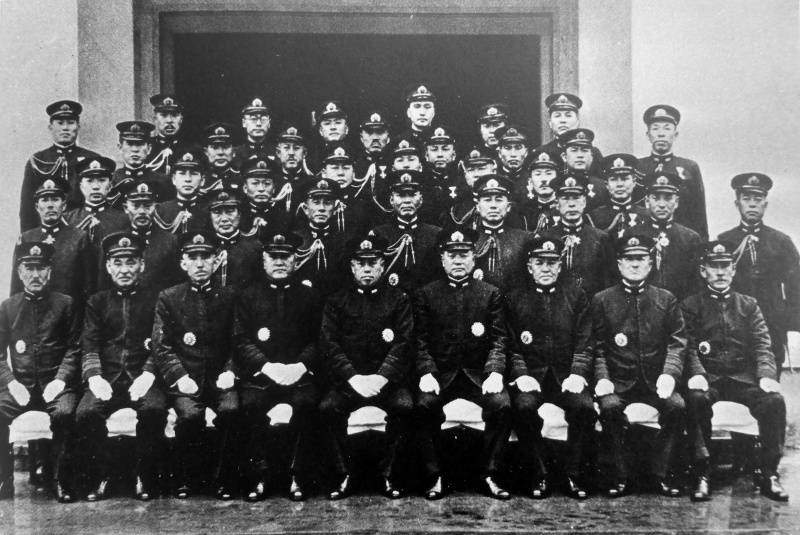
A group shot of the United Fleet Command (the main long-range forces of the Imperial Japanese Navy), taken during the last meeting before the attack on Pearl Harbor. In the middle of the first row sits the commander-in-chief of the fleet, Admiral Isoroku Yamomoto
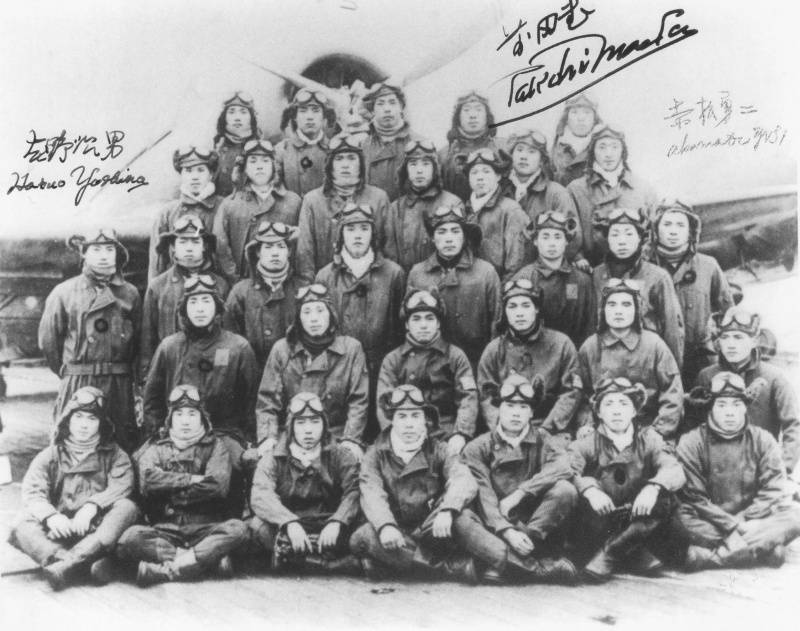
Group photograph of Nakajima B5N ("Kate") crews on the deck of the aircraft carrier "Kaga" a day before the Pearl Harbor raid
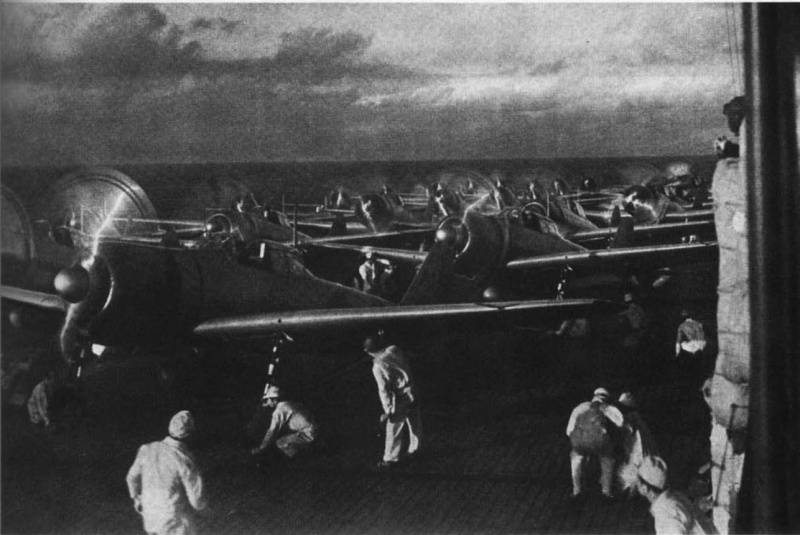
Japanese fighter A6M "Zero" before departure to attack the American base at Pearl Harbor on the deck of the aircraft carrier "Akagi". Photo taken a few minutes before departure.
The top military and political leadership of the United States and Japan made the most important decisions on the same day - November 5, 1941. Washington understood that the decisive steps of Japan are not far off. It was necessary to determine in advance their line of conduct. On November 5, the command of the US military presented detailed recommendations to the president. Higher military leaders reiterated that the main adversary is Germany, and in the war with Japan one should adhere to strategic defense, since the strategic offensive in the Pacific Ocean will absorb the enormous resources necessary for operations in Europe. Fights with Japan should be avoided until the United States has accumulated sufficient military forces in the Pacific.
If Japan in the near future takes the path of armed aggression, then military action against Japan should be undertaken under one or several scenarios: 1) Japan’s aggression against the territory or mandated territory of the United States, the British Commonwealth or the Dutch India; 2) the advance of the Japanese to Thailand, west of 100 east longitude, or south of 10 north latitude, or the invasion of Portuguese Timor, New Caledonia or the Partnership Islands; 3) if the war with Japan cannot be avoided, then a defensive strategy should be followed in order to hold territories and weaken Japanese military and economic power; 4) given the global strategy, the Japanese advance against Kunming, in Thailand, or "The attack on Russia does not justify the intervention of the United States against Japan." Proceeding from all this, the American military believed that relations with Japan should not lead to a rupture. It was recommended that no ultimatums of Tokyo be presented so as not to anger the Japanese. F. Roosevelt agreed with these conclusions.
While in the United States they made plans in anticipation of attacking others and decided in advance not to help the USSR, in Japan they already made accurate calculations of a strike to the south and the United States. The coordinating committee almost never interrupted the meetings. October 23 agreed that there was no other way than war. However, the US military potential is 7-8 times Japanese. Therefore, "there is no way to completely prevail over the United States in the event of war with them" (that is, the Japanese reasonably assessed their potential). Conclusion: it is necessary to conduct a transient campaign with limited goals. 5 November in Tokyo held a decisive meeting of the Privy Council at the emperor. The participants decided that negotiations with the Americans should be continued for the time being and hand Washington two variants of Tokyo’s proposals, conditionally named Plan A and Plan B. If the US government does not accept one of these plans before November 25, then the war.
Plan A provided for: The Japanese Empire agrees with the principle of non-discrimination in international trade in the Pacific and in China, if this principle is recognized in the rest of the world; as for the Tripartite Pact, the Japanese are ready not to expand the sphere of “self-defense” and wish to avoid the spread of the European war in the Pacific; after the conclusion of peace between Japan and China, Japanese troops will remain for 25 years in northern China, on the border of Mongolia and on Hainan Island. If the US rejects Plan A, then it was planned to deliver Plan B, which was in the nature of modus vivendi (a temporary agreement, when under the existing conditions it is impossible to reach a full agreement). Japan pledged to refrain from further expansion in exchange for easing US trade restrictions with it.
The Japanese government agreed with the indicative military indicative day for the start of the war - December 8 (Tokyo time). The deployment of the armed forces began in anticipation of a war with the United States, England and Holland to be ready to start a war. The deployment of the armed forces and diplomatic negotiations now proceeded in parallel. A key figure in the negotiations with the United States became Admiral Nomura. When the Konoe government changed, Nomura asked for resignation. He explained that he did not believe in the possibility of reaching an agreement and did not want to continue "this hypocritical existence, deceiving other people." From Tokyo they said: the new government sincerely wishes to regulate relations with America. Nomura remained at his post. An assistant was sent to him - Kurusu - an old friend of Nomura, a former Japanese ambassador to Berlin who signed the Tripartite Pact. The Japanese ambassadors continued negotiations, unaware of the true intentions of their government. Nomura and Kurusu sincerely hoped to find mutual understanding with the Americans.
American intelligence intercepted and deciphered all of Tokyo's correspondence with the Japanese embassy in Washington. Therefore, Roosevelt and Hell knew the content of the two plans and the deadline for negotiations with the United States - November 25. On this day, the Japanese fleet went out to attack Hawaii. But, apparently, the White House did not know why the success or failure of the negotiations in Tokyo was associated with the exact day indicated.
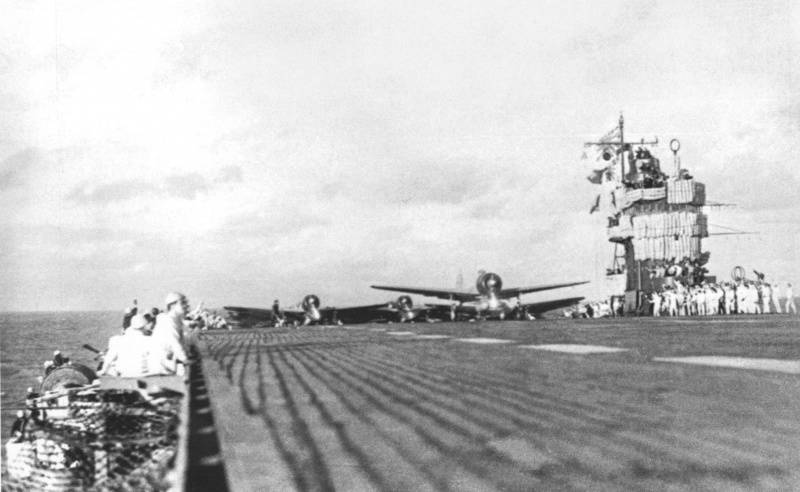
Japanese fighters A6M2 "Zero" from the composition of the second wave of air strikes on the American base Pearl Harbor take off from the deck of the aircraft carrier "Akagi"
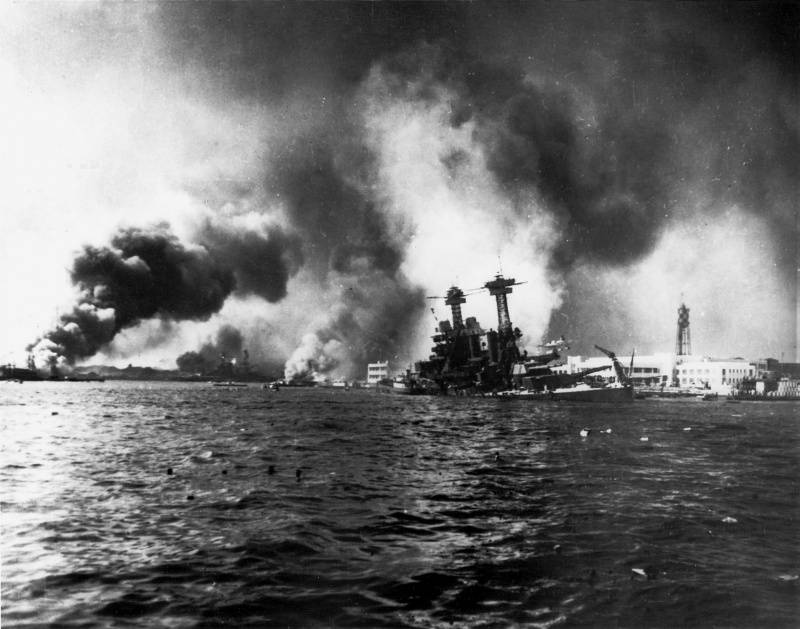
California sinking battleship at Pearl Harbor 7 December 1941 of the year after hitting two torpedoes and two bombs
7 November Nomura presented the plan A. On November 10 the Japanese ambassador was received by the president. When meeting with the Japanese ambassador, Roosevelt limited himself to a lecture on the virtues of the world, the need to promote the prosperity of mankind, and so on. Common words. It is clear that the Japanese could not be satisfied with this answer. Minister Togo was furious and telegraphed to Nomura that the November 25 date was "absolutely impossible to change." The telegram was decrypted and reported to Roosevelt and Hella. On November 9, Halum reported to Nomura that the Japanese proposals for international trade and the Tripartite Pact were unacceptable. Plan A was rejected.
Meanwhile, the tension in Japan was growing. November 17 opened the 77-I emergency session of the Japanese parliament. In the lower house, on behalf of the League of Assistance to the throne, deputy Toshio Simada took the floor. He urged the government to "stop grazing on the road," because "the nation is burned by fire." The United States and England do not cease mocking Japan, but, Shimada reminded, even a Buddha should not be laughed more than three times, generally two times - maximum for a saint. He said: "A cancerous tumor in the Pacific Ocean nests in the minds of arrogant American leaders who seek world domination." A Japanese politician said that a “big knife” is needed to fight cancer. He introduced a resolution that said: "It is completely obvious that the main cause of the current conflict between the Axis and the British, American and Soviet peoples is the insatiable desire of the United States for world domination ...". In this Shimada was absolutely right.
17 November Kurusu flew to Washington and, together with Nomura, met with the US President and the Secretary of State. New negotiations that went on for three days did not lead to a positive result. Roosevelt again raised the question of the withdrawal of Japanese troops from China. This was absolutely unacceptable for Japan, since it destroyed all their political and military successes over a long period of time. Also, Roosevelt, as usual, read exalted sermons that covered the predatory interests of the United States. It became clear that the two powers would not reach an understanding.
On November 20, Nomura and Kurusu presented Hull with a somewhat relaxed Plan B: both governments pledge not to advance their forces in any areas of South-East Asia and the South Pacific, with the exception of Indochina, where Japanese forces are already located; Japan and the United States will cooperate in order to obtain the necessary raw materials from Dutch India; Japan and the United States pledge to restore trade relations, and the United States will supply the necessary amount of oil to Japan; The United States pledges to refrain from taking such measures that would prevent the establishment of peace between Japan and China. Tokyo hoped that the United States would go to modus vivendi. Hull promised the ambassadors to "consider favorably" the Japanese proposals. This encouraged Togo, and he achieved a slight respite from Tokyo, until November 29. This became immediately known in Washington.
From the American response depended to be or not to be a war in the Pacific. If Washington was keen to delay the war with Japan, then the United States should have gone for modus vivendi. The military considered it reasonable that such a position - to delay the start of the war, so that the main task in Europe could be solved. On November 22, the State Department prepared a US draft modus vivendi for a period of 90 days. Its difference from the Japanese plan B was mainly that the Americans demanded the immediate withdrawal of Japanese troops from South Indochina, and in the northern part there should be no more than 25 thousand Japanese soldiers. The rest of the American conditions generally coincided with the Japanese.
November 25 held a meeting of Hull, Stimson and Knox. The participants agreed that it was necessary to transfer American offers to Japan. Then all three arrived at the White House, where a new meeting with the president was held with the participation of Marshall and Stark. There is practically no information about him. Only the entry in the diary of War Minister Henry Stimson: “... we are likely to be attacked, perhaps no later than next Monday (November November 30), because the Japanese are known to attack without warning. What should we do? The problem boils down to how we can maneuver, so that Japan takes the first shot, and at the same time not allow much danger to ourselves. This is a difficult task. ” The meeting said that Japan could go in the direction of the South Seas, but the American possessions would not be attacked. Nevertheless, they decided to pass on to the Japanese ambassadors American proposals on modus vivendi. The military was satisfied with this decision. They received a temporary head start for training in the Pacific. With such an impression, the American security forces, both Ministers - Stimson and Knox and commanders-in-chiefs of the army and navy - Marshall and Stark left the White House.
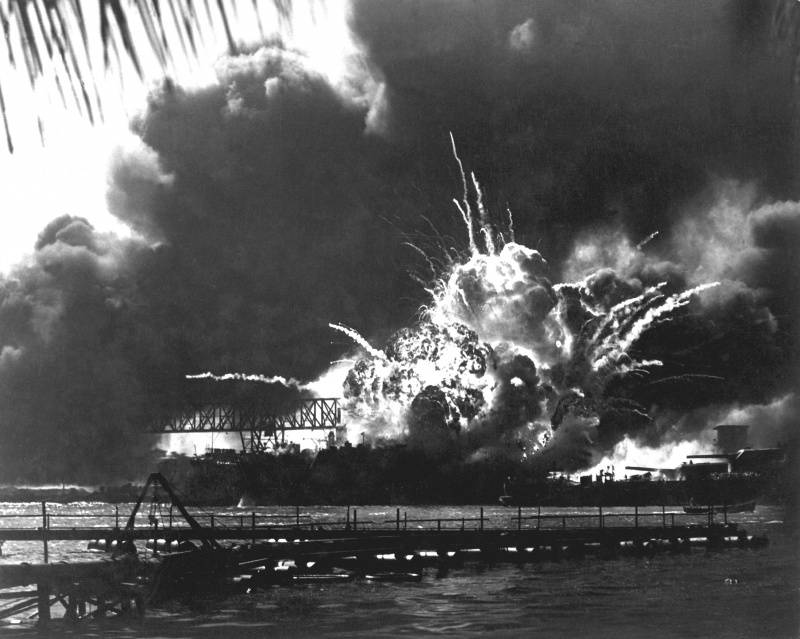
An explosion of ammunition on the destroyer "Show" (USS Shaw) during the attack of Pearl Harbor. The explosion occurred in 9.30 as a result of a fire caused by the hit of three Japanese air bombs. The destroyer was badly damaged, but later it was repaired and re-commissioned.
However, the day after the meeting with the military, the president and the secretary of state made a decision that was the opposite of what had been previously agreed with the military leaders. Intelligence data on the movement of Japanese ships to the south of Formosa (Taiwan) was received, which apparently followed Indochina. This angered Roosevelt: the Japanese are negotiating a full truce and immediately send an expedition to Indochina. The president decided to teach the Japanese a lesson. He summoned Hull and instructed him to take a firm tone at the negotiations. The modus vivendi project has been dropped. The State Department prepared the so-called. "The program of ten points." The Americans offered to Japan to conclude a multilateral non-aggression pact in the Far East; sign a collective agreement on the integrity of Indochina; withdraw all troops from China; both governments will enter into negotiations on a trade agreement, etc.
As a result, The United States offered Japan to restore, by its free will, the position that existed before September 1931, that is, before the start of the Japanese seizures in China. To abandon all the seizures and acquisitions in China, which for Tokyo was the main condition for a possible agreement with the United States. And the conquest of Manchuria and other areas of China cost Japan considerable blood and sweat. Manchuria became the second military-industrial base of the Japanese Empire. Her loss meant an economic catastrophe for the empire.
In the evening of November 26, Hell presented the document to Nomura and Kurusu. In fact, it was an ultimatum. However, at the same time, the Americans left the Japanese a “window of opportunity” - Washington did not offer Japan to immediately get out of China under the masked threat of war or tough economic sanctions. The Americans showed Japan that it was attracting aggression to it in a southerly direction, but did not close the door to a compromise if Tokyo thought again and abandoned the idea of moving south. That is, the hope that Japan is attacking Russia, was still. US naval intelligence, for example, reported to the government on December 1: “Relations between Japan and Russia remain tense. On November 25, Japan, along with Germany and other Axis powers, extended the Anti-Comintern Pact for five years. Hella’s program should not provoke Japan into a war against the USA, but, on the contrary, discourage her from moving towards the South Seas. Japan showed that the way there is closed and will entail war.
Japanese statesmen turned out to be more direct people; they did not grasp such a sophisticated cunning of American diplomacy. Dispatch Nomura with the text of the response of Hull came during a meeting of the Coordinating Committee. Tojo read the paper. Silence was interrupted by someone shouting: “This is an ultimatum!” The American response put an end to the last hesitations in Tokyo. Events began to "develop automatically."
In this way, until the very last moment, the masters of Washington tried to induce Tokyo to direct aggression to the north - against the Soviet Union. As researcher N. Yakovlev noted: “The facts indisputably say that the American answer, or ultimatum, from November 26 was a“ big cudgel ”with which the United States sometimes achieved its goals. At the end of 1941, they wanted to push Japan against the Soviet Union, and to stand by themselves. If you do not accept this thesis, you should agree either with political speculators in the United States who accuse F. Roosevelt of deliberately setting up the Pacific Fleet as a bait for Japan to get a reason to involve the American people in the war, or to suspect an epidemic of mass madness in Washington: Knowing about the approaching war, they took no precautions there. But the leaders of the foreign policy of the United States were in their right mind and memory. ”
Washington firmly believed that Japan’s attack on Russia would follow when the martial law of the Soviet Union deteriorated sharply. At the end of November 1941, the perfect moment arrived (the first was in the summer of 1941), according to American leaders, to strike at the USSR. German and Finnish troops besieged Leningrad, the Wehrmacht broke through to the near approaches to Moscow, reached the Don in the south, and from Japan there were reports of the enormous strengthening of the Kwantung Army aimed at the Soviet Far East. The deployment of the Japanese army and air forces showed Japan's preparation for war with the USSR. Of the 51 divisions that the Japanese empire had in November 1941, the 21 division was in China, the 13 division was in Manchuria, the 7 divisions were in the metropolis, and only the 11 divisions could be used in other areas. From 5, 3 air fleets were located on the mainland and on the Japanese islands, and only 2 were free. It was hard to imagine that Japan would start a war against the United States and England, against which you can throw (as in fact it happened) only 11 divisions, that is, about 20% of the Japanese army.
Intelligence agencies and data deciphering reported that the Japanese armed forces are preparing for war in all areas. That is, Japan could attack any of the opponents - the USSR, the USA and England. However, the likelihood that Japan is attacking Russia in the first place was the highest. Japan was closest to Russia, which made it possible to use both the strategic base and the base of Japan itself, and Manchuria. The Japanese already had a combat-ready army in Manchuria. Japan held most of the fleet in the metropolis. Therefore, actions against Russia could be taken as quickly as possible. In late November - early December 1941, the command of the American fleet believed that the main Japanese aircraft carriers were in the waters of the Japanese metropolis, and it was calm. The Americans believed that the Japanese were about to strike at the Russians.
Thus, the owners of the United States until the last moment pushed Japan to the north and waited for the Japanese to attack the Russians. The blessing of the moment was the most favorable - the Russians were bleeding to restrain the enemy and the walls of Leningrad and Moscow. The miscalculation of the Americans was that they underestimated the Japanese. The Japanese military-political leadership realized that they wanted to pave the way for the United States to win. Destroy Russia with the help of the Germans and the Japanese. Use the Japanese as "cannon fodder". The Japanese knew the power of the Russians well, and did not want the Americans to use them in their game. Having bitten the game of the cunning and cunning enemy, they acted in their own way. 7 December 1941 attacked Pearl Harbor, hoping to temporarily turn off the enemy with a swift attack, seize the territories needed by the Japanese Empire and then reach an agreement. Japan presented a good lesson to the overdue US owners who thought that they had everything under control.
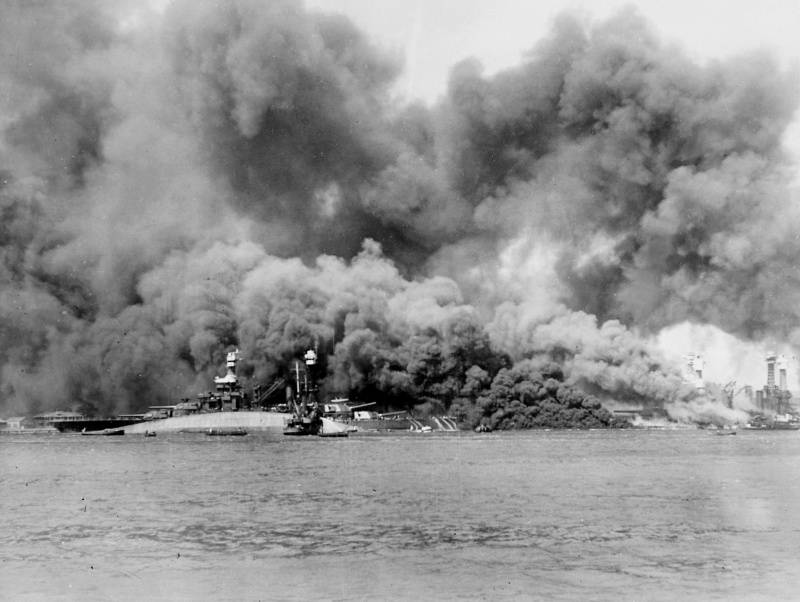
American battleships after the Japanese attack of Pearl Harbor. In the foreground - the Oklahoma battleship (USS Oklahoma (BB-37)) that turned over due to the hitting of nine Japanese torpedoes, followed by the Maryland (USS Maryland (BB-46), which was moored near the Oklahoma), on the right is burning West Virginia (USS West Virginia (BB-48). Photo source: http://waralbum.ru/
Sources:
Zubok L.I., N.N. Yakovlev. The newest story United States (1917 - 1968). - M .: Enlightenment, 1972.
The history of the war in the Pacific (in five volumes). - M .: Foreign Literature Publishing House, 1957, 1958.
The history of the Second World War 1939-1945's. (in 12 volumes). - M .: Military Publishing, 1973-1982.
Kremlin S. Russia and Japan: Bleed! - M .: Yauza, 2005.
Lan V. USA in the war and postwar years. - M. Science, 1978.
Lan V. USA: from the first to the second world war. - M .: Science, 1976.
Utkin A. Russian-Japanese War. At the beginning of all troubles. - M .: Eksmo, Algorithm, 2005.
Yakovlev N. N. 3 September 1945. - M .: Eksmo, 2003.
Yakovlev N. Franklin Roosevelt. Man and politician. - M .: International Relations, 1969.
- Alexander Samsonov
- How did the USA set Japan on the Soviet Union (Russia)
Shame day
How the United States set Japan on Russia
World massacre brought closer the onset of the "American Century" - US global domination
"The main military efforts of Japan will be directed against the coastal regions of Russia"
Roosevelt and Churchill built their policies so as to win the victory mostly by proxy
Information